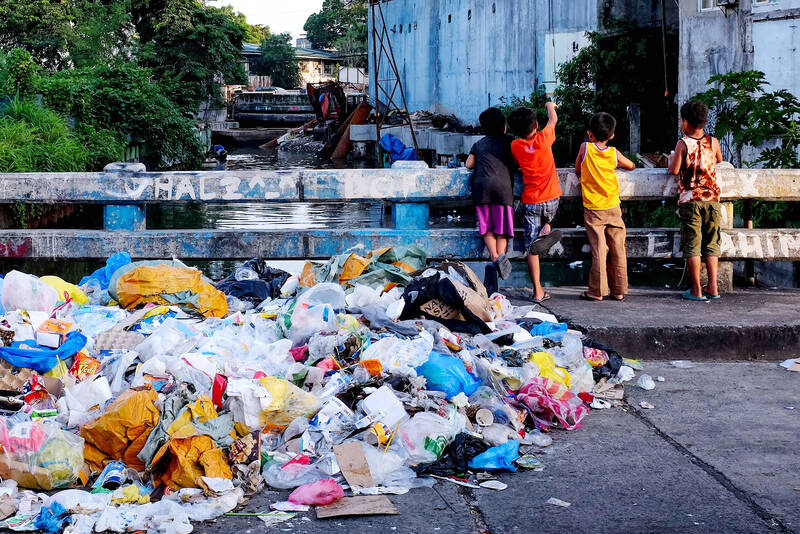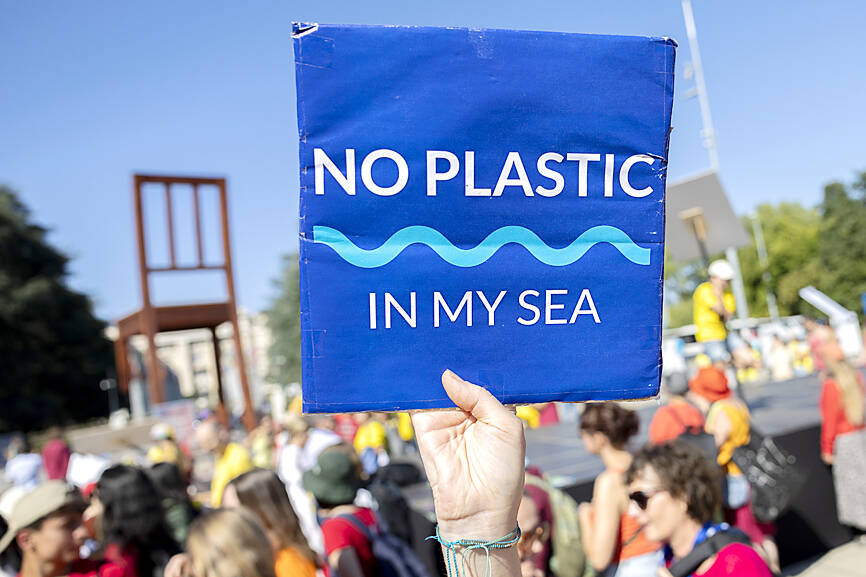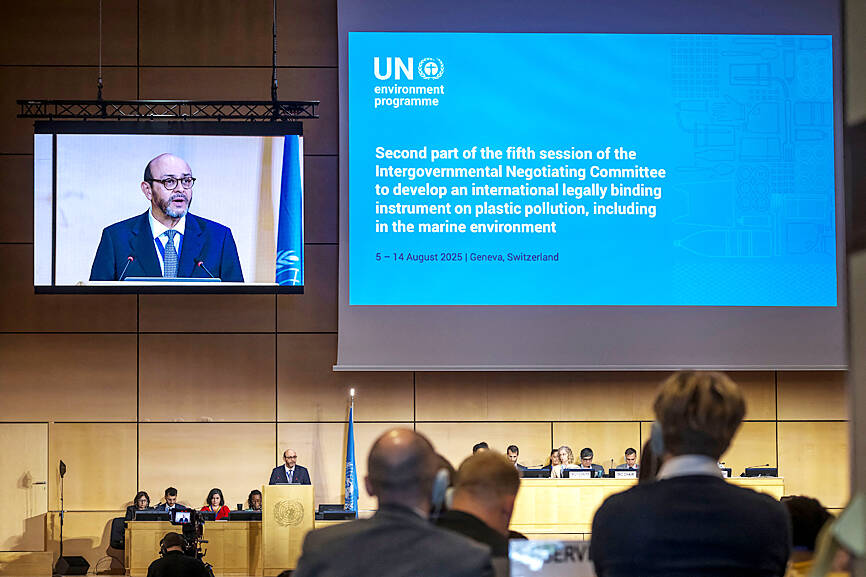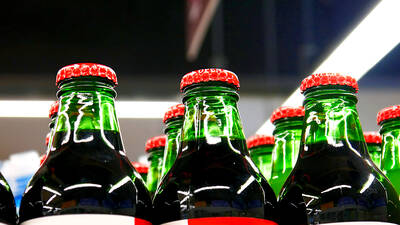Talks aimed at striking a landmark global treaty on plastic pollution fell apart Friday last week as countries failed to find consensus on how the world should tackle the ever-growing scourge.
The talks in Geneva — called after the collapse of the fifth and supposedly final round of talks in South Korea late last year — opened on Aug. 5.
Negotiators from 185 nations worked beyond last Thursday’s deadline and through the night in an ultimately futile search for common ground.

Photo: AFP 照片:法新社
A large bloc wants bold action such as curbing plastic production, while a smaller clutch of oil-producing states want to focus more narrowly on waste management.
The stalemate was a resounding failure for the environment and for international diplomacy at a time when its frailties are in the spotlight.
Countries voiced anger and despair as the talks unravelled, but said they wanted future negotiations — despite six rounds of talks over three years now having failed to find agreement.

Photo: EPA 照片:歐新社
“We have missed a historic opportunity but we have to keep going and act urgently,” said Cuba.
Colombia added: “The negotiations were consistently blocked by a small number of states who simply don’t want an agreement.”
Tuvalu, speaking for 14 Pacific small island developing states, said: “For our islands this means that without global cooperation and state action, millions of tonnes of plastic waste will continue to be dumped in our oceans, affecting our ecosystem, food security, livelihood and culture.”

Photo: AFP 照片:法新社
INSURMOUTANBLE DEADLOCK
The High Ambition Coalition, which includes the European Union, Britain and Canada, and many African and Latin American countries, wanted to see language on reducing plastic production and the phasing out of toxic chemicals used in plastics.
The cluster of mostly oil-producing states calling themselves the Like-Minded Group — including Saudi Arabia, Kuwait, Russia, Iran and Malaysia — want a much narrower remit. These countries railed against the negotiations being based on the entire life-cycle of plastic: from the petroleum-derived substance right through to waste.
Bahrain said it wanted a treaty that “does not penalize developing countries for exploiting their own resources.”
Talks chair Luis Vayas Valdivieso said the session had merely been adjourned rather than ended. He said that countries and the secretariat “will be working to try to find a date and also a place” for resuming the talks.
The negotiations were hosted by the UN Environment Programme.
Environmental NGOs warned that without radically changing the process to better reflect the majority view, future talks would hit the same dead end — while plastic garbage would continue choking the environment.
DUMPED, BURNED AND DISCARDED
More than 400 million tonnes of plastic are produced globally each year, half of which is for single-use items.
While 15 percent of plastic waste is collected for recycling, only nine percent is actually recycled.
Nearly half, or 46 percent, ends up in landfills, while 17 percent is incinerated and 22 percent is mismanaged and becomes litter.
The plastic pollution problem is so ubiquitous that microplastics have been found on the highest mountain peaks, in the deepest ocean trench and scattered throughout almost every part of the human body.
On current trends, annual production of fossil-fuel-based plastics will nearly triple by 2060 to 1.2 billion tonnes, while waste will exceed one billion tonnes, according to the Organization for Economic Cooperation and Development.
(AFP)
對於日益嚴重的塑膠污染問題,各國未能達成共識,因此一項具里程碑意義的全球條約上週五談判破裂。
由於去年底在南韓舉行的第五輪、原本被視為最終回合的談判破裂,因此召開了新一輪的談判,8月5日在日內瓦展開。
來自185個國家的談判代表在上週四的最後期限過後仍徹夜協商,尋求共識,但最後功敗垂成。
多國組成的一個大陣營要求採取大刀闊斧的行動,例如限制塑膠生產,而少數產油國則主張,重點只能聚焦在廢棄物管理。
在國際外交的弱點日益凸顯之際,這種僵局對環境和國際外交而言是徹底的失敗。
隨著談判破裂,各國表達了憤怒與失望,但仍強調希望未來能繼續談判——儘管三年來已舉行了六輪談判,但至今仍未達成協議。
古巴表示:「我們錯失了一個歷史性的機會,但我們必須繼續前進,並採取緊急行動」。
哥倫比亞補充道:「談判一再被少數幾個根本不想達成協議的國家阻撓」。
吐瓦魯代表14個太平洋小島發展中國家發言時指出:「沒有全球合作及各國的行動,對我們這些島嶼國家來說,這意味數百萬噸塑膠垃圾將繼續傾倒在海洋,影響我們的生態系統、糧食安全、生計與文化」。
無法突破的僵局
「雄心壯志聯盟」由歐盟、英國、加拿大以及多個非洲與拉丁美洲國家組成,他們希望看到條約文本納入減少塑膠生產與逐步淘汰塑膠中有毒化學物質的規定。
然而,以沙烏地阿拉伯、科威特、俄羅斯、伊朗、馬來西亞等產油國為主的「志同道合集團」則要求大幅縮小談判範圍。這些國家強烈反對將談判建立在塑膠的整個生命週期之上:從石化原料到廢棄物。
巴林表示,希望條約「不會讓開發中國家因開發自身資源而受到懲罰」。
談判主席路易斯.瓦亞斯.瓦迪維索強調,會議僅是「休會」,而不是結束。他表示,各國和秘書處「將努力尋找合適的日期和地點」以恢復談判。
談判是由聯合國環境規劃署主辦。
非政府環保組織警告,若不徹底改革談判機制,讓大多數人的意見更能反映出來,未來的談判將陷入同樣的死胡同,而塑膠垃圾將繼續扼殺環境。
傾倒、焚燒與丟棄
全球每年生產超過4億噸塑膠,其中一半是用完即丟的一次性物品。
雖然15%的塑膠垃圾被收集起來,但實際上只有 9%被回收利用。
近一半(46%)的塑膠垃圾最終進入掩埋場,17%被焚燒,另有22%因管理不當而淪為垃圾。
塑膠污染無所不在,從最高的山峰到最深的海溝,甚至在人體的幾乎每一個部位,都發現了塑膠微粒。
根據經濟合作暨發展組織的推估,照目前趨勢發展下去,到了2060年,以化石燃料製成的塑膠,年產量將達現今的三倍,達到12億噸,而塑膠垃圾將超過10億噸。
(台北時報林俐凱編譯)

It graced statues, colored coffins, and decorated artifacts. It is Egyptian blue, the world’s oldest-known synthetic pigment born in ancient Egypt. Despite its name, it is not limited to a single hue. It ranges from deep blue to greenish tones, often glowing with an almost unearthly brilliance. __1__ In response, the ancient Egyptians developed a synthetic alternative. Not only was it visually striking, but it was also more affordable than imported indigo or natural lapis lazuli. Traces of the pigment have been discovered far beyond Egypt, from wall paintings in Pompeii to tiles in Mesopotamia. However, Egyptian blue began to fall

Bilingual Story is a fictionalized account. 雙語故事部分內容純屬虛構。 Just yesterday, the boy had helped hang the lucky red couplets. Tonight, as firecrackers signaled the New Year, he lay in bed burning with a surging fever. The herbalist checked the boy’s pulse and went still. “The only cure is in the county town across the mountains,” he said. “But the snow is deep, and the shops are shuttered until the Fourth Day.” The boy’s father looked at the window. “I will go.” “The roads are impassable for a cart,” the herbalist warned. “And too far for a man on foot.” The concerned neighbor

Contrary to popular belief, glass bottles may pose a greater microplastic risk than plastic ones. A recent study found that beverages stored in glass bottles can contain up to 50 times more microplastic particles than those in plastic containers. Researchers traced most of the contamination to the paint on the outside of the metal caps. The particles found in the drinks matched the cap’s coating in both color and composition. Experts suggest the issue may result from microscopic scratches that form as caps rub against each other during transport or storage. Such scratches can damage the painted coating, leading

1. 我沒有兄弟姊妹。 ˇ I have no brother(s) and sister(s). ˇ I don’t have any brothers or sisters. ˇ I have no siblings. χ I have not any brothers or sisters. 註:首句 no 是形容詞,加在名詞前作修飾用,意思等於 don’t have any。I have not any 是彆扭過時的講法,現代英文一般會說 I don’t have any... 或 I have no...。 又如:*In totalitarian countries people have not any freedom. 應改為 people have no freedom. 或 people do not have any freedom. 2 不要怕那隻狗。 ˇ Don’t be afraid of the dog. ˇ Don’t fear the dog. χ Don’t afraid of the dog. 註:afraid 是形容詞,在句中作補語,前面必須加 be 動詞。注意:「我不怕熱」,一般不說 *I’m not afraid of hot weather. 可以說:Hot weather doesn’t bother me. 3. 他準備好了嗎? ˇ Has he got everything